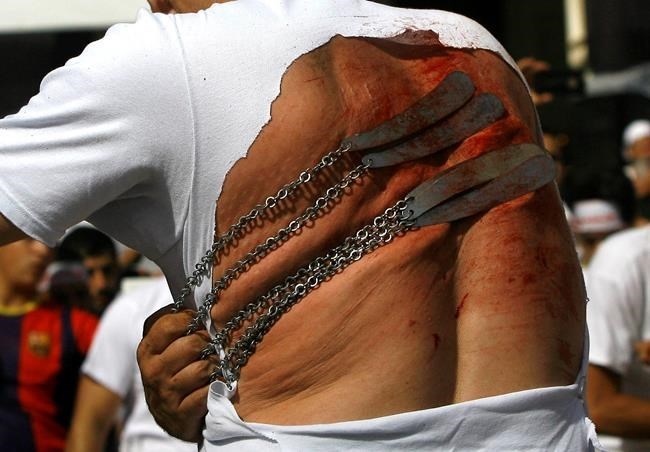
A Lebanese Shiite man strikes his back with knifes to show his grief during Ashoura rituals, in the southern market town of Nabatiyeh, Lebanon, Wednesday, Oct. 12, 2016. Hundreds of men, boys, and several women, are commemorating the 7th century martyrdom of Prophet's Muhammad's grandson Hussein, in a Shiite tradition in Lebanon's south by lashing their foreheads and backs in a blood-soaked, open air parade. (AP Photo/Mohammed Zaatari)
Republished October 12, 2016 - 8:57 AM
Original Publication Date October 12, 2016 - 5:05 AM
NABATIYEH, Lebanon - Shiite Muslims world over are observing the Ashoura, a holy day of mourning and the sect's most important religious ceremony commemorating the death in 680 AD of the Prophet Muhammad's grandson, Imam Hussein.
Hussein was killed along with 72 friends and family members in the battle of Karbala, in present-day Iraq. Shiites contend that Hussein's father Ali was unfairly passed over for leadership of the young Muslim caliphate after the death of the prophet.
Hussein's death at Karbala was a crucial blow to their rebellion and one of the turning points that spawned Islam's Sunni-Shiite divide.
Here is a look at some of the ceremonies taking place on Wednesday:
LEBANON
Hundreds of men and boys, and several women lashed their foreheads and backs, drawing blood during an open air procession in the southern Lebanese town of Nabaityeh to mark the Ashoura, which falls on the 10th day of the month of Muhharam on the Islamic calendar.
In the courtyard of a historic town mosque, boys as young as three wailed in bewilderment as they received incisions with a razor blade on their foreheads, to facilitate bleeding from the lashes. Women, too, proceeded to the courtyard to cut their foreheads and pound their brows and chant "Haydar," another name for Hussein.
The ceremony is symbolic to show regret for not being able to fight with Hussein. In other parts of Lebanon, it is frowned upon and rallies honouring Hussein were held. Some religious leaders have suggested that believers donate blood instead.
In Nabaityeh, the air smelled rusty and blood trickled down the path of the procession. Saeed Sleiman, one of the participants, said, "We don't fear anything."
IRAN
Millions of faithful in Shiite power Iran observed the Ashoura, converging on the streets and in mosques with heavy hearts for mourning processions. During the ceremonies, the faithful are dressed in black and eulogies are recited in memory of Hussein and his 72 companions.
President Hassan Rouhani went to the holy shrine of Hazrat Abdolazim in Shahr-e Rey, in southern Tehran, to join a mourning procession, along with several other ranking officials.
For Ashoura, Iranians traditionally cook food for charity and distribute it among their neighbours, family and the poor. Free food is also offered to people who perform the mourning rites. Many Iranians also travelled to Iraq to mourn close to Hussein's shrine in the holy city of Karbala.
AFGHANISTAN
Ashoura Day is a public holiday in Afghanistan where this year, police urged Shiite worshippers to avoid large gatherings as attacks were expected. Shiites make up an estimated 15 per cent of Afghanistan's population of around 30 million and most of them are ethnic Hazaras. Militant Sunni fundamentalists like the Taliban and the Islamic State group view Shiites as apostates and frequently attack Shiite mosques and public gatherings.
At least one gunman entered Kabul's biggest Shiite shrine on Tuesday night, opening fire and killing at least 17 worshippers and wounding 62.
And, in northern Balkh province, an explosion struck a group of Shiite worshippers Wednesday, killing at least 14 civilians and wounding 26.
PAKISTAN
Pakistan's Shiite Muslims held Ashoura processions amid tight security, gathering at their places of worship in cities, towns and villages and later marching through the streets as the country observed a two-day holiday.
Many of the faithful beat their chests and lashed themselves with knives attached to chains amid beefed-up security on the streets. In recent years, Ashoura processions have been attacked by extremist Sunni militants.
In Lahore, the cultural capital of Pakistan, thousands gathered in the walled city to take part in the procession. In Karachi, the country's largest city and the capital of southern Sindh province, Shiite scholar Hasan Zafar Naqvi denounced violence and said the Ashoura processions will "give courage to all the innocent victims."
Similar processions also took place in Quetta, the capital of Baluchistan province and elsewhere in the northwest.
Pakistani authorities used helicopters and surveillance cameras to monitor the processions and suspended mobile phone services in parts of the country as part of security measures against possible attacks.
___
Associated Press Writers Rahim Faiez in Kabul, Afghanistan; Munir Ahmed in Islamabad and Amir Vahdat in Tehran, Iran, contributed to this story.
News from © The Associated Press, 2016